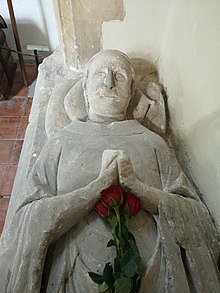William of Heytesbury, or William Heytesbury, or William de Heytisbury, called in Latin Guglielmus Hentisberus or Tisberus (c. 1313 – 1372/1373), was an English philosopher and logician, best known as one of the Oxford Calculators of Merton College, Oxford, where he was a fellow.
| William of Heytesbury | |
|---|---|
 |
Life
Heytesbury had become a fellow of Merton by 1330. In his work he applied logical techniques to the problems of divisibility, the continuum, and kinematics. His magnum opus was the Regulae solvendi sophismata (Rules for Solving Sophisms), written about 1335.
He was Chancellor of the University of Oxford for the year 1371 to 1372.
Works
- 1335 - Regulae solvendi sophismata (Rules for Solving Sophisms)
- 1. On insoluble sentences
- 2. On knowing and doubting
- 3. On relative terms
- 4. On beginning and ceasing
- 5. On maxima and minima
- 6. On the three categories (De tribus praedicamentis)
- 1483 - De probationibus conclusionum tractatus regularum solvendi sophismata (On the Proofs of Conclusions from the Treatise of Rules for Resolving Syllogisms) - Pavia
- Liber Calculationum
Notes
- W. A. Wallace, Prelude to Galileo: Essays on Medieval and Sixteenth-Century Sources of Galileo's Thought, Dodrecth: Reidel 1981, p. 60.
- Longeway, John. "William Heytesbury". In Zalta, Edward N. (ed.). Stanford Encyclopedia of Philosophy.
Further reading
- Sylla, Edith (1982), "The Oxford Calculators", in Norman Kretzmann, Anthony Kenny & Pinborg (edd.), The Cambridge History of Later Medieval Philosophy.
- Murdoch, John (1982), "Infinity and Continuity", in Kretzmann, Kenny & Pinborg (edd.), The Cambridge History of Later Medieval Philosophy.
- Curtis, Wilson (1956), William Heytesbury. Medieval Logic and the Rise of Mathematical Physics. Madison: University of Wisconsin Press.
External links
- Miroslav Hanke; Elzbieta Jung (2022). "William Heytesbury". Stanford Encyclopedia of Philosophy.
| Academic offices | ||
|---|---|---|
| Preceded byAdam de Toneworth | Chancellor of the University of Oxford 1371–1372 |
Succeeded byWilliam de Remmyngton |
This biography of an English philosopher is a stub. You can help Misplaced Pages by expanding it. |